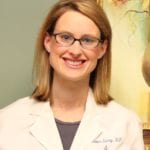Recognizing Hidradenitis Suppurativa
By Guest Blogger Allison King, FNP-C
Have you ever seen a patient who complains of recurrent boils under their arms? What about a patient with recurrent acne or cysts in their groin area? The patient likely has Hidradenitis Suppurativa (HS), a chronic, inflammatory condition of the skin. Unfortunately, most HS patients go undiagnosed for years, which increases the risk of scarring, disease progression, and long-term physical and psychological effects. Let’s break down the facts about HS in order to make the correct diagnosis earlier in the disease process.
Who gets HS?
- Both men and women. Current statistics show women are 3x more likely to have HS; however, this may be because women typically see a healthcare provider more regularly and have their axilla and groin areas examined during routine GYN exams.
- More than 1/3 of HS patients also have a family member with the disease.
- All ethnicities.
What does it look like?
- Inflamed papules, nodules, or abscesses typically found in skin folds.
- The lesions typically flare and become swollen, tender, inflamed, and may drain.
- Open comedones, or blackheads, are often found in the affected areas.
- Hyperpigmented or depressed scarring in skin folds
- More severe cases have deep sinus tracts, or tunnels under the skin, connecting inflammatory lesions or scarring.
- Moderate to severe cases may have thick, banded scarring.
When does it happen?
- Typically starts around the time of puberty- early 20’s.
- Rarely develops after age 50.
Where does it affect?
- Armpits, buttocks, inner thighs, genitalia, chest beneath breasts.
- May involve 1 area or multiple areas.
- Disease severity is not always consistent between different areas. For example, the patient may have mild disease in the groin and moderate to severe disease in the armpits.
Why does it happen?
- We don’t the exact cause of HS. We do know that inflammation and the immune system play a role.
Myths about HS:
- HS is not caused by a bacterial infection. It may become secondarily infected, but bacteria is not the source of the problem.
- It is not contagious or sexually transmitted.
- It is not due to poor hygiene.
- It is not preventable with dietary or lifestyle changes.
- It is not curable with weight loss.
Keys to diagnosis:
- Suspect HS when a patient complains of recurrent pimples, boils, abscesses, or nodules on the armpits, buttocks, inner thighs, genitalia, or beneath the breasts.
- Suspect HS in a patient with depressed or hyperpigmented scarring in the beforementioned areas.
What are the next steps after diagnosis?
- Great online resources for patients are www.nobsabouths.com and www.hopeforhs.org.
- Recognizing and correctly diagnosing HS is incredibly helpful for the patient. A correct diagnosis frees them from the guilt and stigma of thinking they have something contagious, bacterial, or sexually transmitted.
- If the patient has access to a dermatology clinic, refer for treatment. There is only 1 FDA approved treatment for HS, Adalimumab. This is typically prescribed and managed by dermatology specialists.
- If the patient does not have access to a dermatology clinic, Benzoyl peroxide cleansers, topical Clindamycin, oral Spironolactone, oral antibiotics, and laser hair reduction are commonly used treatments.
- A great resource for providers is the 2019 JAAD article titled “North American Clinic Management Guidelines for Hidradenitis Suppurativa: A Publication from the United States and Canadian Hidradenitis Suppurativa Foundations”.
For more tips to treating common dermatologic conditions, check out our post-graduate training and education program, ThriveAP. ThriveAP spends some time covering dermatology as well as several other systems of the body in our year long program geared towards primary care. After NPs and PAs finish school, there is a lot they are expected to know in their first few years of practice. ThriveAP is meant to ease the transition into practice by providing live online webinars for continued didactic learning and mentorship. For more information, please contact info@thriveap.com.
 Allison King, FNP-C, studied at the University of Mississippi undergraduate and then continued on to receive her Masters at Vanderbilt University School of Nursing. She has been practicing at Mid-South Dermatology in Memphis, TN since 2008, and is a frequent speaker for ThriveAP. Allison is a member of the Memphis Dermatology Society, the Nurse Practitioner Society of the Dermatology Nurses’ Association, and serves as the regional president of the Mid-South chapter of the National Academy of Dermatology Nurse
Allison King, FNP-C, studied at the University of Mississippi undergraduate and then continued on to receive her Masters at Vanderbilt University School of Nursing. She has been practicing at Mid-South Dermatology in Memphis, TN since 2008, and is a frequent speaker for ThriveAP. Allison is a member of the Memphis Dermatology Society, the Nurse Practitioner Society of the Dermatology Nurses’ Association, and serves as the regional president of the Mid-South chapter of the National Academy of Dermatology Nurse

